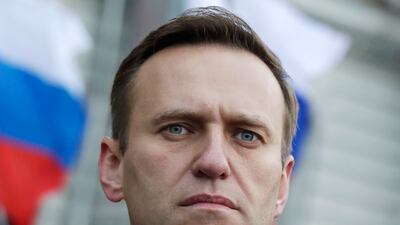Kremlin critic Alexei Navalny has been sentenced to an additional 19 years in jail on extremism charges, which he has rejected as politically motivated.
Mr Navalny, already serving a nine-year term, was sentenced to nearly two decades' more in prison following a behind-closed-doors trial in a penal colony east of Moscow.
Appearing gaunt in court but displaying a defiant smile, the 47-year-old was convicted on extremism charges related to his anti-corruption foundation.
Following the ruling, the dissident said the purpose of giving him more time in jail was to frighten Russians, but urged them not to be cowed and to think hard about how best to resist what he called the “villains and thieves in the Kremlin”.
Western nations condemned the court decision and demanded that the jailed dissident be released immediately.
The US on Friday criticised what it saw as “an unjust conclusion to an unjust trial”.
“The United States condemns a Russian court's further sentencing and conviction of opposition politician and anti-corruption campaigner Aleksei Navalny,” the US State Department said in a statement.
“For years, the Kremlin has attempted to silence Navalny and prevent his calls for transparency and accountability from reaching the Russian people.
“By conducting this latest trial in secret and limiting his lawyers' access to purported evidence, Russian authorities illustrated yet again both the baselessness of their case and the lack of due process afforded to those who dare to criticise the regime.”
US Secretary of State Antony Blinken posted on social media that “the Kremlin cannot silence the truth – Navalny should be released”.
UN Human Rights chief Volker Turk said the sentence raised renewed serious concerns about judicial harassment and the use of the court system for political purposes in Russia.
Britain joined the chorus of condemnation, saying “dissent cannot be silenced”.
“His abuse shows Russia's complete disregard for even the most basic of human rights,” UK Foreign Secretary James Cleverly said on social media.
The trial has been held behind closed doors at the IK-6 penal colony, a maximum-security prison about 250 kilometres east of Moscow, where Mr Navalny has been jailed.
Journalists were not let into the courtroom but able to watch proceedings on CCTV from a special media room nearby.
Mr Navalny's team said the judge had added 19 years to his existing terms. State prosecutors had asked for 20.
Unconfirmed Russian media reports said that Mr Navalny would be 74 years old by the time he got out of prison in 2050.
The former blogger, lawyer and corruption investigator has cast himself as a political martyr whose aim is to demonstrate to Russians that it is possible to resist Mr Putin, albeit at great cost.
“For a new, free, rich country to be born, it must have parents. Those who want it. Who expect it and who are willing to make sacrifices for its birth,” Mr Navalny said in his closing statement last month.
The charges relate to his role in his defunct movement inside Russia, which authorities accused of trying to foment a revolution by seeking to destabilise the sociopolitical situation.
A small group of Navalny supporters had gathered outside the penal colony but were not let in to hear the verdict.

